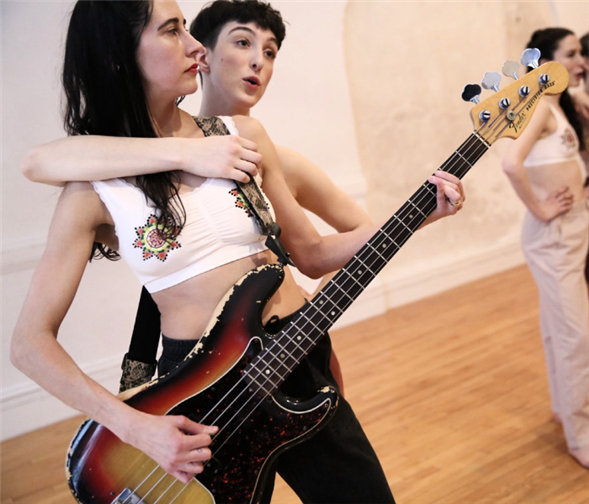Translate Page

Dancer-choreographer Jody Oberfelder completes her body-part trilogy with Madame Ovary
---
After investigating the heart and head in her immersive dance works 4CHAMBERS and The Brain Piece, choreographer Jody Oberfelder wondered where she should travel for the final installment of her body-part trilogy. She landed on the gut and genitals, and the resulting world-premiere work, Madame Ovary, playing at the Flea Theater May 15 to 19, examines gender identity, sexuality, agency and the ever-evolving terrain of womanhood.
While Gustave Flaubert's groundbreaking 19th-century novel Madame Bovary serves as a very loose foundation, Oberfelder's athletic, modern movement is the work's centerpiece. Legs slice diagonally; a trio performs unexpected lifts as one pulls away; bodies cascade into plank positions and fun hand-jive sections all collide. There are also interactive and multimedia elements. Dancers lead audiences on a preshow treasure hunt, part of the score is a stable of punk songs by Oberfelder herself and she even folds in a film she made when she was eight months pregnant.
Oberfelder also dances in Madame Ovary, which she thought was important as a mature performer. "I feel like people look at an older body differently, like it's not okay," she says. "But I love dancing, and it's been hard not to perform. So it's part of the expression, and I think it's good for audiences to see a range of ages, not just the virtuosic wonder of younger people. You're always a dancer... even past 45."
Oberfelder hopes Madame Ovary will inspire audiences to interrogate their notions of gender and sexuality, just as creating the work did for her. "I've been educated while working on this piece," she admits, adding that she read multiple translations of Madame Bovary and feminist theory like Natalie Angier's Woman: An Intimate Geography as fodder. "My whole life, I grew up in a binary system. I was a kid who was super active and not very feminine, and I did not enjoy being looked down on for being part of the 'fairer sex.' My feistiness and proclivity to be muscular got me labeled as a tomboy, but it was still within that system. I'm realizing that, even though feminism has been large in my life, wanting equality for women is not the only game in town. It's not just about being gay or straight, male or female."
Two performers in the piece who identify as nonbinary helped Oberfelder expand her awareness. "It's interesting because I've had to rechoreograph and rethink not just a band of women, but a cast of strong people who are asking: Are we defined by our bodies?" she says.
This ultramodern perspective is juxtaposed with references to Flaubert's classic novel about a woman who's destroyed by the gender constraints of her era. "I'm hoping audiences will see a held-back person versus a breaking-out person in the loose portrayal of Madame Bovary/Ovary, and how that's connected to a contemporary idea of owning who we are," Oberfelder says. "The two energies -- fluid or abstract versus 19th-century propriety -- bump up against each other in the piece. For example, Missy Mazzoli's music is abstract, but it's countered by the lyrics I've written, which are specific and articulate ideas in a different way than dance. The words aren't mysterious at all." Case in point: her song "BYOB:" "BYOB/Bring your own body. BYOB/Bring your own fluidity... LGBTQIA. U R U. Hooray!"
In the studio, Oberfelder and her team played with different phrases of movement, often based on key terms and conversations about identity and gender. "We taught each other some moves after picking certain words out," she says. "There were already little, teeny stories that wove together eventually. One day, we went out for a green juice and I asked my performers, 'How do you think it's going? Is it what you want it to be?' When they all said yes, I felt good that everyone in the room had a voice." That kind of inclusion and understanding is exactly the point of Madame Ovary.
---
TDF MEMBERS: At press time, discount tickets were available for Madame Ovary. Go here to browse our current offers.
Lauren Phoenix Kay regularly contributes to TDF Stages.
Top image: Madame Ovary in rehearsal. Photo by Paula Court.